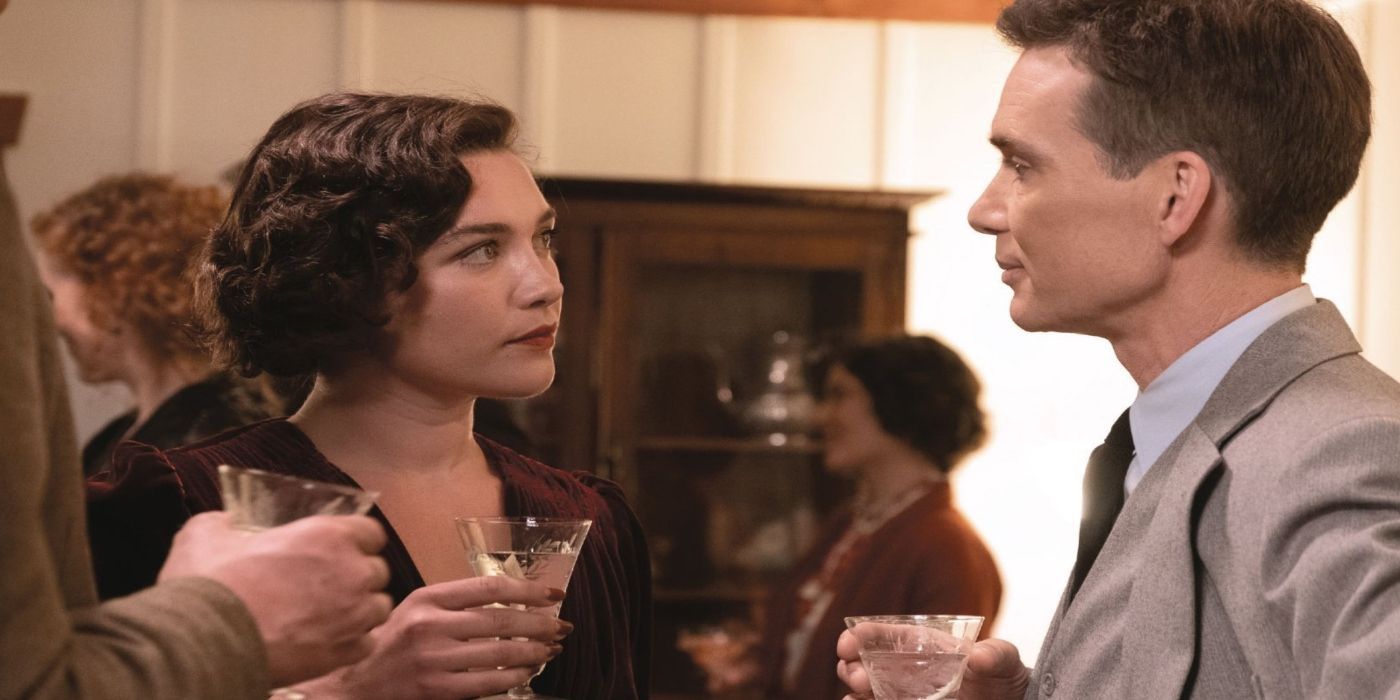The Big Picture
- Christopher Nolan’s tendency to prioritize troubled male protagonists comes at the expense of his female characters.
- Kitty Oppenheimer is the best female character in Nolan’s films, but her potential is still squandered.
- The depiction of Jean Tatlock, another female character, is limited and fails to explore her complexities and struggles.
Despite being among the most celebrated and recognizable filmmakers of the past 20 years, it’s no secret that Christopher Nolan‘s successful legacy fails to extend to female characters. His films always center on the male point of view, which isn’t an automatic misstep. Most creators draw upon their fundamental experiences to make transformative art. There’s also a potential “stay in your lane” argument to be made: nine times out of 10, women writers will portray fictional women with deeper nuance because of these lived-in experiences. However, Nolan’s tendency to highlight a string of troubled, genius guys has almost always happened at the expense of his female characters. Instead of inhabiting — and enriching! — his labyrinthine worlds with distinct complexity, Nolan reduces his women into simulacrums: plot devices, one-dimensional love interests, or a combination of both tropes. Oppenheimer, the staggering apex of Nolan’s career, continues this unfortunate trend.
Oppenheimer
The story of American scientist, J. Robert Oppenheimer, and his role in the development of the atomic bomb.
- Release Date
- July 21, 2023
- Runtime
- 180 minutes
‘Oppenheimer’ Continues a Frustrating Pattern in Christopher Nolan’s Movies
Memento, Christopher Nolan’s first feature-length directorial outing and a beloved of film studies curriculums, operates as a stylistic harbinger of the writer-director’s audacious imagination. Sadly, one of his oft-repeated tendencies is as tired as time immemorial: a protagonist motivated by a dead wife. Memento is a more forgivable crime since it’s the product of a first-time director from the early 2000s, yet the pattern stubbornly persisted. Inception kept a traumatized and deceased wife up its sleeve as its narrative trump card, while The Prestige and The Dark Knight killed off a love interest so their respective men could suffer psychological devastation (and pursue unethical coping mechanisms). 2020’s Tenet severely limited its female lead in a narrative that demanded a delicate touch and instead became an echo chamber.
These instances don’t feel deliberately vindictive on Nolan’s part; they strike me as casual, unconscious dismissals. And not all of Nolan’s women characters fall by the wayside. Inception‘s Ariadne (Elliot Page), Selina Kyle (Anne Hathaway) of The Dark Knight Rises, and Interstellar‘s Murphy Cooper (Jessica Chastain) aren’t prey to his usual stereotypes and are more compelling for it. They also don’t spend their movies locked into a heterosexual romance. When it comes to Nolan’s repetitive and restrictive tendencies, that might be the most telling indicator.
To be fair, Nolan tackled an intimidating project with Oppenheimer and did an equally impressive job condensing a wealth of material. Nolan streamlines J. Robert Oppenheimer’s life into a three-hour extravaganza with few distractions or deviations, bringing his considerable experience and awe-inspiring ambition to bear and channeling both into a haunting, riveting behemoth of a feature. Oppenheimer is his career triumph to date — which, if you’re a fan, makes for a nigh-transcendent experience. Nolan even broke with screenplay norms and wrote the film’s script in first-person rather than the traditional omniscient third-person perspective. As such, most of the supporting cast is filtered through Oppenheimer’s subjective gaze and drawn in broad strokes. Incorporating more would’ve extended Oppenheimer‘s already considerable runtime, which isn’t an automatic negative but remains a factor to consider.
Kitty Oppenheimer Is Christopher Nolan’s Best Female Character, but Her Potential Is Still Squandered
Unlike his other women characters, Kitty Oppenheimer (Emily Blunt) isn’t Nolan’s original creation. Her characterization is easily one of Nolan’s best efforts, in large part because she faces explicitly gendered conundrums. Nevertheless, both Kitty and Jean Tatlock (Florence Pugh) have far less accumulated screen time than their male counterparts. Some of that’s understandable given the limited roles available to women in the 1930s and 1940s. However, Nolan incorporates women scientists and activists. Their presences in this somber fever dream are intentional and organic. Rather than smooth out Nolan’s rough edges, such inclusion casts Kitty and Jean’s roles into even starker relief. Just because the era dictated white male dominance doesn’t mean Kitty and Jean should be similarly set on the sidelines. If anything, their depictions as the only relevant women in J. Robert Oppenheimer’s life demand more than the movie’s scant flexibility can give.
Kitty, in particular, is a rich tapestry of potential and a vast improvement on Nolan’s past works. Kitty doesn’t exist merely to be Oppenheimer’s wife, and although she stands beside him as an emotional lifeline, the pair’s marriage is turbulent and complicated. Blunt and Cillian Murphy‘s easily combustible chemistry speaks to that fact, and Kitty’s introductory scenes establish her as a force to be reckoned with. She became a biologist through skill and grit only to find herself in the same shoes as countless other women: sacrificing her career aspirations and limited opportunities to become a lonely, unfulfilled housewife several times over. She’s stifled by motherhood and domestic life, a topic that isn’t portrayed often enough in media or with enough sympathy. Kitty’s lingering wants simmer like a banked fire that the lightest wind could whip into an inferno.

‘Oppenheimer’ Review: Christopher Nolan Delivers His Most Colossal and Mature Film Yet
Cillian Murphy is remarkable in a film that feels like what Nolan’s entire career has been building towards.
Kitty’s also more emotionally active than her husband, frequently shoving him out of complacency. Her initiative paints the couple with shades of the “behind every great man is an even greater woman” trope. Blunt makes Kitty’s misery palpable through her bitten-off words and frustrated body language, only to face down a table of hostile men with the poised, dormant ferocity of a waiting cobra. Her false capitulation to the “irrational woman” stereotype just so she can turn the tables is brilliantly manipulative.
Nevertheless, Kitty exists only in these scattered fragments. Nolan paints a vibrant outline the audience must fill with color. Such subtlety might be commendable, except those prone to believing stereotypes might misread Kitty’s actions as heartless, inconsistent, or histrionic rather than representing a living woman who contained as many multitudes as her husband. Emily Blunt spoke highly of the script, and I respect her perspective while still longing for more.
Florence Pugh’s Jean Tatlock Suffers Worse Than Kitty Oppenheimer
The same goes for Jean Tatlock in lesser degrees. The real Jean was a remarkable figure: a reporter and a writer who studied to be a professional psychiatrist and lived with acute depression. As a bisexual or possibly lesbian woman, some historians suggest Jean struggled with her sexuality at a time when being LGBTQIA+ was even more viciously demonized and legally punishable.
Nolan’s script does hint at Jean’s hidden depths. She’s certainly no wilting flower. But if Kitty’s depiction stated her troubles explicitly, then Jean’s life is a mere whisper. For all that Oppenheimer skirts around the Communist party, the movie doesn’t explore why Jean believed in the movement enough to be an active member. Beyond some choice dialogue, Nolan leaves the deeper ramifications of Jean’s mental health struggles similarly unexplored; her sexuality isn’t addressed at all. Despite her role’s brevity, Florence Pugh raved about her on-set experience, and Pugh could almost run off with the movie. But Jean’s agency is reduced to maneuvering around a man. The character always feels close to screaming, desperate to snap free of the script’s limiting bonds.
Fictional women can exist as part of a man’s story while still boasting rich internal lives. Emphasizing their interiority can only enhance a story, not bog it down. Instead, Christopher Nolan’s ongoing — if likely unintentional — disregard for female characters results in half-realized worlds drowned in routine male viewpoints, even if said viewpoints are brilliantly evocative and increasingly humanist. As an ardent Nolan fan who’s spent years frustrated with this tendency despite his work always proving deeply resonant, it’s another disappointment even as I celebrate Oppenheimer as the jewel of Nolan’s crown. Men can change and doom the world; we just exist in the crowds.
Oppenheimer is available to stream on Peacock in the U.S.
Watch on Peacock
Source link

